The 2022 Russian invasion of Ukraine and the Western sanctions that followed have derailed cooperation among the members of the Arctic Council, an intergovernmental body of eight countries with Arctic territories, after 25 years of facilitating climate science, polar diplomacy, and polar marine research.
A gathering of international polar experts spoke about the new geopolitical reality this week at a livestreamed Dartmouth event—Climate Diplomacy on Thin Ice: Navigating Arctic Cooperation & Polar Governance—hosted by the John Sloan Dickey Center for International Understanding’s Institute of Arctic Studies. The public session was part of an ongoing conference at Dartmouth on rethinking Arctic collaboration.
“What we first have to understand is that with the loss of Russia as a partner in the Arctic we lose also half of the geography, half of the area to study,” said Ole Øvretveit, manager and researcher of the Arctic Science Diplomacy Project at the University of Bergen and Academia Europaea Bergen in Norway.
Unfortunately with this new geopolitical reality, the work of polar research and diplomacy has now taken a secondary position to issues of security, said Volker Rachold, head of the German Arctic Office at the Alfred Wegener Institute of the Helmholtz Centre for Polar and Marine Research in Germany.
“We have eight countries in the Arctic, one is Russia and the other seven are NATO members,” Rachold said. “We need to make sure things in the Arctic stay peaceful, but the mechanism for that may actually require deterrence rather than dialogue, which of course is very sad.”
Joining Øvretveit and Rachold in Hanover this week for the Arctic Studies conference were Matthias Kaiser, International Science Council Fellow and professor emeritus at the Center for the Study of the Sciences and Humanities at the University of Bergen, and Jenny Baeseman, a U.S-based Arctic and polar consultant who is former executive director of the Scientific Committee on Antarctic Research and former director of the Climate and the Cryosphere Project.
The four reported on the ongoing Arctic Council discussions at a public event Nov. 18 moderated by Melody Brown Burkins, Guarini ’95, ’98, director of the Institute of Arctic Studies. Some 35 people attended the event via livestream and in person at Haldeman Hall.
At a time when polar regions are warming at a rate nearly four times that of the rest of the globe, and as institutions like the Arctic Council have worked to bring voices of all Arctic stakeholders—from Arctic Indigenous Peoples, to community development groups, to the business sector—into the discussion, addressing the ramifications of losing connection to half of the Arctic territories is important, Burkins said.
“In a rapidly shifting Arctic geopolitical landscape, convening thoughtful, collaborative discussions has never been more critical,” Burkins said. “Current challenges to Arctic scientific cooperation following Russia’s full-scale invasion of Ukraine have changed the dynamics of scientific and diplomatic collaboration at a time when shared solutions to Arctic challenges are urgently needed.”
With the loss of collaboration with the Russian scientists, communities, and the Russian government in the Arctic, Kaiser said, climate scientists, now more than ever, have to find ways to involve a wider range of communities in the discussion of how the world can meet the challenges of climate change. Too often scientists act as if presenting their data and proposing solutions to the world in a vacuum is all that is required, but there remains a big gap between science and politics, he said.
“Communicating facts is not enough,” Kaiser said. “We need to have a discussion about the values that drive the changes. In other words, what is the kind of future that I would wish for not just myself, but for my children and grandchildren.”
The scientific community must understand that all stakeholders and rightsholders, including Indigenous Peoples or other residents of the Arctic regions, are seeking to uphold the values of their cultures.
“There is no such thing as a global correct list of values,” he said. “We need to engage in that discussion with them. Most of the people, when they do engage, will see that there are many ways to manage that.”
Now faced with an ascendant politics of climate denial, Baeseman said, even business and corporate leaders will benefit from this kind of values discussion.
“We’ve got to think outside the box. Let’s include businesses. Take insurance companies. Think of the sea-level rise and the money they’re going to have to put into that. Why aren’t they funding sea-level research? It seems to me it would be a lot cheaper for them to fund sea-level research versus to pay for what’s going to happen to Florida,” Baeseman said.
The participants in the Arctic Institute conference also worked on envisioning projects and themes to bring to the discussions for the next International Polar Year (IPY) in 2032-33. An extensive interdisciplinary and multilateral scientific program already being planned by global organizations, IPY has the potential to bring global focus, funding, and multilateral cooperation to global challenges facing the Arctic and the Antarctic regions and, in turn, our planet, said Burkins.
During the four previous International Polar Years, in 1882, 1932, 1957, and 2007, the success of international scientific collaboration catalyzed multilateral negotiations that led to the demilitarization of the Antarctic and the Antarctic Treaty System (IPY/IGY 1957-58). Scientific findings from the fourth IPY (IPY 2007-8) emphasized the need for a robust governance framework for managing the Arctic’s rapid environmental and socioeconomic changes. This spurred the Arctic Council to take on a more prominent governance role, facilitating the first binding agreements for the Arctic region: the 2011 Arctic Search and Rescue Agreement and the 2013 Agreement on Cooperation on Marine Oil Pollution Preparedness and Response in the Arctic.
“This Dartmouth convening of diverse scholars and experts is also a writing workshop to develop recommendations for the Arctic and polar science envisioned for International Polar Year-5 in 2032, the next major global polar science initiative,” Burkins said.

